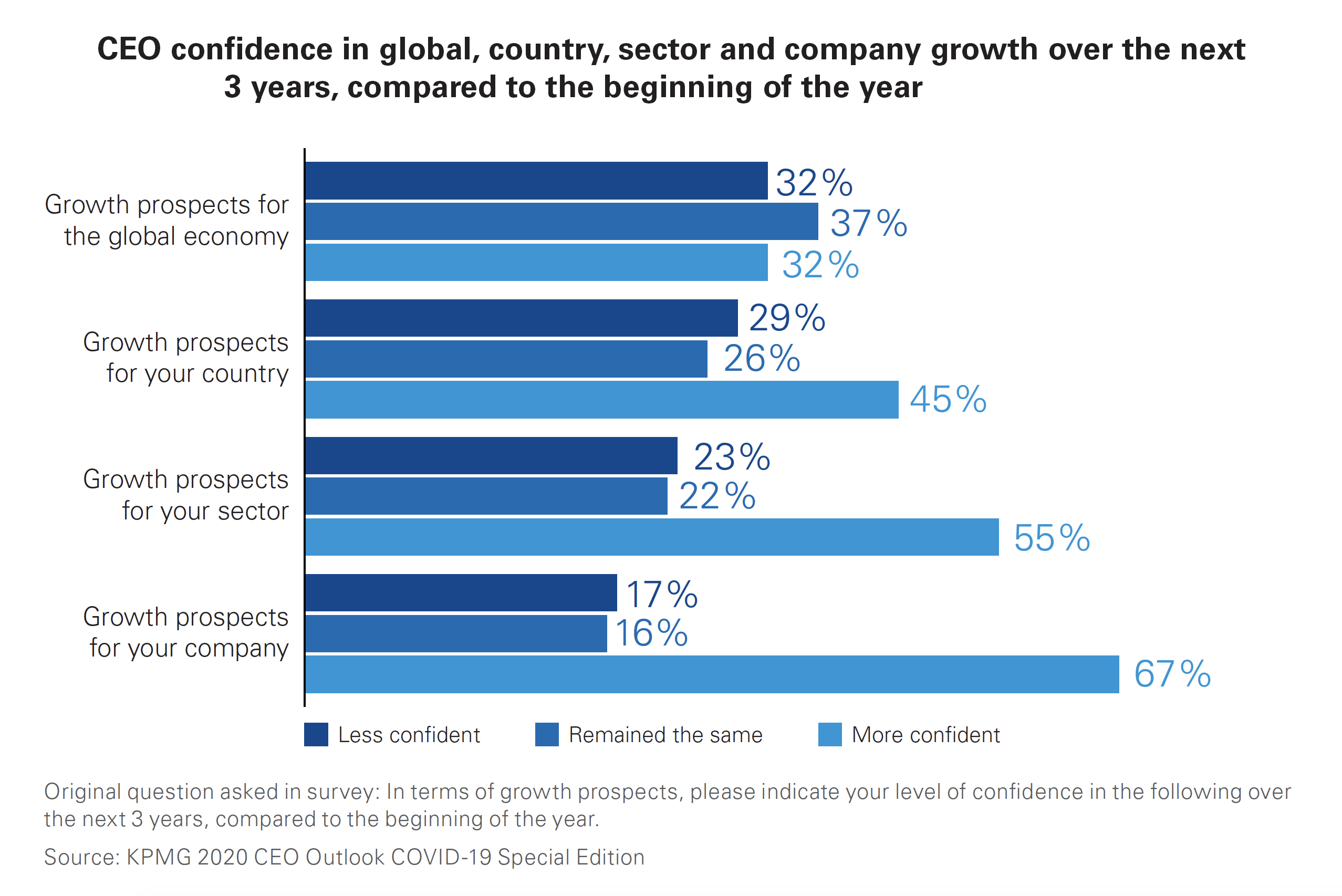Covid-19 has shaken the confidence of corporate bosses in global economic growth. Compared to their counterparts in other countries, however, chief executive officers in China have a more stable and confident outlook on the domestic economy and their businesses, according to two rounds of surveys conducted by KPMG.
The accounting firm conducted the first survey in January to February at the beginning of the pandemic, and then a follow-up survey in July to August.
The surveys reveal that one-third of CEOs interviewed (32%) are less confident about prospects for global growth over the next three years than they were at the start of the year. However, this loss of confidence is not as dramatic when CEOs consider what the future holds for their companies, with only 17 percent less confident today. They are more confident in mastering their own company’s fortunes, where they have more control and levers of influence, the surveys show.

Says Raymond Ng, head of market development at KPMG China: “China has the largest consumer market in the world. Despite the fact that demand is recovering more slowly than supply due to the pandemic, as quarantine measures are gradually reduced, we believe that the recovery of consumer demand is expected to be the spotlight of China economy in the second half of 2020, and that domestic consumption will be a major pillar in stabilizing China’s economic growth. Meanwhile, China is accelerating the development of new infrastructure and the digital economy in urban clusters, further unleashing the potential of China's growing consumer market.”
The surveys find that global CEOs’ risks and concerns have evolved significantly. Some CEOs of the world’s most influential companies have identified talent risk as one of the most significant challenges to growth. At the same time, the pandemic has prompted China CEOs to re-evaluate their wider societal contributions and corporate purpose.
Faced with the uncertainties created by the pandemic, China’s CEOs are focusing their future planning efforts on areas such as talent risk, supply chain risk, and digital transformation of their companies, says Honson To, chairman of KPMG China and Asia Pacific. Talent retention has become a major issue for companies in various countries after the pandemic, as retaining key staff and attracting professional talent have a significant impact on future business performance.
According to the surveys, three-quarters of China CEOs say they will be re-evaluating their global supply chains. Key supply chain management considerations include having a more agile response to changing customer needs, improved supply chain resilience for natural disasters, and proximity to customers. Only 9% of global CEOs surveyed say they will consider moving their supply chains back to their home countries due to government pressure.
Says Jeffrey Wong, head of advisory, KPMG China: “CEOs have identified talent risk as the number one challenge following the outbreak. Companies need to develop targeted talent management strategies and detailed operational plans to maintain long-term sustainable growth, such as improving the compliance for remote work, ensuring the availability of office equipment and resources, and establishing efficient communication mechanisms with employees.”
Digital transformation
According to the July-August survey, 55% of China CEOs believe that the pandemic has sharply accelerated their company's transition to digital operations, compared to the global average of 30%. China CEOs are particularly interested in emerging technologies such as artificial intelligence and cloud computing. Both surveys indicate that China CEOs see cyber security risks, including the risk of cyber-attacks and potential data loss, as a critical challenge for their operations.
“Digital transformation is impacting various industries, especially financial services, healthcare, consumer goods and manufacturing,” says Reynold Liu, head of management consulting, KPMG China. “Accelerated by the pandemic, the tremendous importance of technology is becoming more and more apparent, and technology companies have been given great opportunities for development. In the foreseeable future, enterprises will face various innovation-related challenges as they accelerate their digital transformation and aim to enhance the customer’s digital experience. In order to fully embrace the digital economy, Chinese companies will need to speed up their digital transformation to unlock value and improve their core competencies.”
Covid-19 has also changed the way companies work. With centralized workplaces having been affected by the pandemic, 80% of China CEOs in the July/August survey say they will downsize their office space in the near term. That’s 11 percentage points higher than the global average of 69%. At the same time, 85% of China CEOs say remote working has also expanded their company's potential talent pool, while 75% of them say their communication with employees has improved during the pandemic.
The pandemic has accelerated a transition to the virtual office model, and this reinforces the need for companies to integrate digital strategy into their business continuity plans, KPMG says. Companies need to adopt more flexible measures to protect and train talents, and secure business operations. This also requires companies to transition more of their traditional HR functions to digital to increase productivity and improve employee experiences. Adopting a flexible and resilient approach to workforce management is essential in coming years.
As a result of the pandemic, corporate bosses are paying more attention to the disclosure of environment, social and governance (ESG) information and corporate social responsibility (CSR) issues involving their companies. Among the respondents, 90% of China CEOs say they have felt a stronger emotional connection with their companies since the crisis began, significantly higher than the global level of 79%. Similarly, 90% of China CEOs say they will do more to meet the needs of employees, communities, partners, investors, and other stakeholders. This indicator is also significantly higher than the global average of 77%.
David Ko, head of audit at KPMG China, says: “With the ongoing liberalization of capital markets in China, there is an increased focus on the ESG disclosures of listed companies. At the same time, many more financial institutions and enterprises in China are also taking ESG into considerations when organizing their business. Against the backdrop of an increasing societal focus on sustainable development, strengthening ESG disclosures is an unavoidable and necessary requirement for enterprises.”









